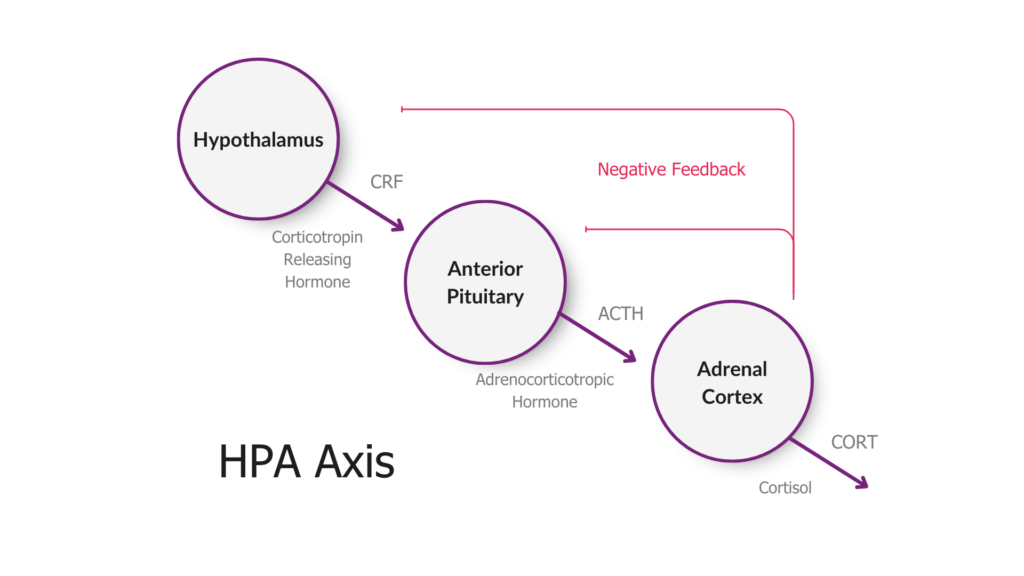
New research suggests affron® saffron effectively normalized HPA–axis dysregulation, enhancing adaptation to stressful experiences.
A new in vivo study sheds light to the stress relief effect of saffron (Crocus sativus L). The research highlights the ability of affron®, a standardized extract of saffron to enhance resilience to ocassional stress.
The new study, led by Chae-Young Kim PhD, and published November 2023 in the journal Nutrients, focuses on affron’s role in regulating the hypothalamic–pituitary–adrenal (HPA axis). Results demonstrated significant improvements following repeated oral administration of the extract in stress model animal subjects.
The stress signal
The HPA axis is a vital brain signaling system involved in orchestrating responses to stress. It functions to assure survival in life-threatening situations, and its activation provides the energy for a “fight or flight” response. However, persistent activation of the HPA axis due to prolonged stress results in chronic elevated levels of the steroidal hormone glucocorticoids (cortisol in humans), which can have detrimental effects on overall health.
The study involved 40 Wistar rats divided into four groups. Three groups were subjected to a series of standardised stress tests during the 4-week trial. Two of the groups were administered daily oral doses of affron at levels corresponding to 100mg/kg and 200mg/kg, respectively. The third group was subjected to stress without receiving affron, and the fourth group received no interventions at all as a control. Several stress-related parameters were evaluated, including hypothalamic gene expression and stress hormone levels.
The two groups of affron treated rats showed marked decreases in the presence of arginine vasopressin and Corticotropin Releasing Factors (CRF) within the hypothalamus. These hormones play a pivotal role in triggering the release of other stress-related hormones, including adrenocorticotropic hormone (ACTH) from the pituitary gland, which in turn signals the adrenal glands to release cortisol(corticotropin in rodents). Serum concentration of these secondary hormones increased at first and then diminished by the third week, with a more pronounced reduction noted in the higher dose group.
The high dose group also experienced a significant reduction in glucocorticoid receptor (GR) expression, reflecting a properly functioning negative feedback mechanism for orchestrating daily rhythms, managing stress responses, and facilitating adaptation to changing conditions. This effect avoids the known glucocorticoid receptor resistance that occurs due to the continuous release of glucocorticoids. The ability to mitigate this resistance through reduced GR expression demonstrates the body’s effectiveness in managing stress.
Saffron lightens the stress load
“Chronic or excessive activation of the HPA axis and prolonged elevation of these hormones can contribute to the maladaptative response called allostatic overload—a state of cumulative strain wherein the body and mind get overwhelmed by constant anxiety or challenges, but don’t have the time to recover,” explains Inés Morán, PhD, Scientific Studies Manager at Pharmactive. “Beyond the mental overload, it can contribute to various health problems, such as metabolic diseases, and accelerate long-term wear and tear on the body’s systems.”
Further examination of the affron treated rats showed they maintained high levels of Brain-Derived Neurotrophic Factor (BDNF) in the hypothalamus tissue, a protein that promotes brain plasticity, and eases the adaptation in response to life experiences by ensuring the growth, survival, and maintenance of nerve cells.
The rats were also subject to a Sucrose Preference Test in which the three groups subjected to stress were observed to lose interest in sugar. Supplement with affron revived interest in sugar.
“This outcome is significant, because extreme cases of anxiety or depression, can produce symptoms of anhedonia, which is a lack of interest and motivation for anything, including food,” adds Morán. The renewed interest in sugar is evidence of a behavioural improvement due to the rebalanced levels of physiological regulators tested in the affron-treated groups.
Current global challenges, such as political instabilities, pandemics, and economic upheavals, have brought the multifaceted impact of chronic stress to the forefront. Simultaneously, the consumer demand for “better-for-you” solutions is fueling deeper exploration of botanicals and other natural agents for relief.

Saffron is a distinguished botanical with a rich history of medicinal use. A series of studies previously confirmed the efficacy of affron across diverse populations (including adolescents) in alleviating stress, tension, and mood disturbances while enhancing mental well-being.
“Despite the growing body of research on saffron’s properties, which includes six published studies of our proprietary, highly concentrated saffron extract, few studies have specifically investigated its role in normalizing the regulation of the HPA axis, a crucial system for stress modulation in the body” asserts Carlos Rodríguez, Communication Manager for Pharmactive. “Through ongoing research, we are unearthing more about saffron’s benefits on cognitive well-being, and its mechanisms of action. We are realizing these extend beyond influencing serotonin expression but actually demonstrates a potential to boost resilience to chronic stress and prevent its detrimental impact on overall mental and physical health.”
If you want more information you can write here: marketing@pharmactive.eu

